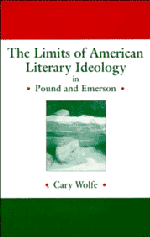Book contents
2 - Critiques of Capitalist (Literary) Production
Published online by Cambridge University Press: 08 February 2010
Summary
What clinches the Pound/Emerson connection is not only that both writers worked squarely within the ideology of individualism – Emerson its premier exponent in American literary history, Pound its not-soobvious modernist inheritor – but mainly that the ideology they shared generated in both largely the same conclusions about those social institutions and cultural conventions that bore down upon the active center of their politics. Pound's storied career as magazine editor, advisor, and all-around promoter and guru testifies to the fact that, for him, the problem of ideology was a good deal more complex than simply endorsing or rejecting a given “world view.” Indeed, the target of Pound's critique of literary production is not so much “false consciousness” as it is enforced consciousness shaped and reproduced by material institutions and practices. In this respect, Pound's modernism can be sharply distinguished from Emerson's romantic side, the Emerson for whom it would be overly simple, but not wrong, to say that something very much like false consciousness prevents the liberation of the self-reliant individual.
But there was another Emerson, of course, and that one sounded very much like Pound the shrewd modernist when he zeroed in on the relationship between economic production and ideological reproduction. That Emerson was dismayed to find that the increasing division of labor and the insidious logic of specialization in capitalist production had found their way into cultural and scholarly practice as well.
- Type
- Chapter
- Information
- Publisher: Cambridge University PressPrint publication year: 1994



